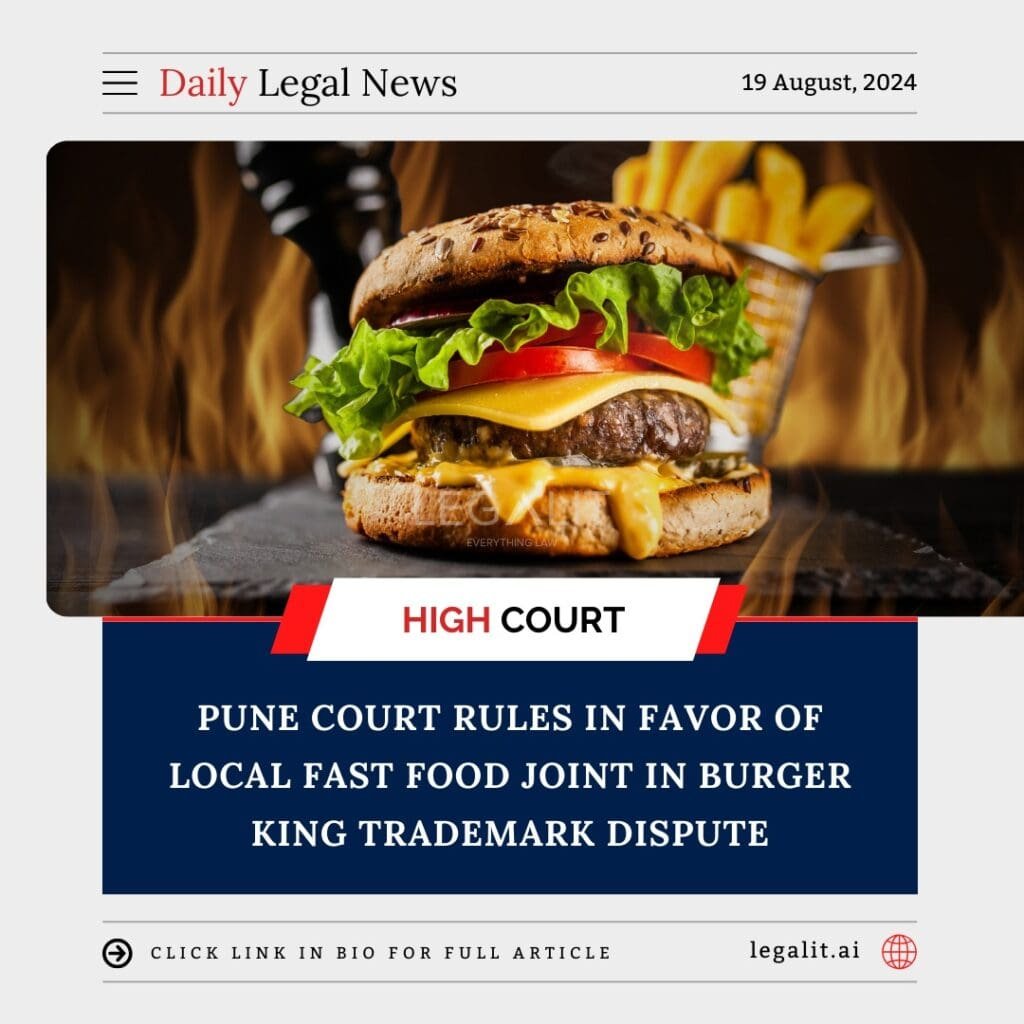
In a closely watched legal battle, a court in Pune has ruled in favor of a local fast food joint in a trademark dispute with the international fast-food giant, Burger King. The case highlights the complexities of trademark law, especially when it comes to protecting the rights of smaller businesses against large corporations in an increasingly globalized marketplace.
Background of the Case
The trademark dispute arose when Burger King, a globally recognized fast-food chain known for its burgers and other quick-service meals, filed a lawsuit against a local Pune-based fast food joint. The multinational company claimed that the local business was infringing on its trademark by using a name, branding, or menu items that were confusingly similar to those of Burger King, potentially misleading customers and diluting its brand.
The local fast food joint, on the other hand, argued that it was operating within its legal rights and that there was no intention to infringe on Burger King’s trademark. The local business may have claimed that its branding was sufficiently distinct and that it had been in operation for a significant period without causing confusion among customers.
Court’s Ruling
- Victory for the Local Joint: The Pune court ruled in favor of the local fast food joint, effectively dismissing the claims made by Burger King. The court may have found that the local business did not infringe on Burger King’s trademark or that there was no substantial evidence to suggest that customers were being misled.
- Trademark Law Considerations: The ruling likely considered key aspects of trademark law, including the distinctiveness of the trademarks, the likelihood of confusion among consumers, and the intention behind the use of the contested brand elements. The court may have determined that the local joint’s branding was sufficiently different from that of Burger King to avoid consumer confusion.
- Protection of Small Businesses: The court’s decision can be seen as a victory for small businesses, emphasizing that they too have the right to operate under their chosen branding as long as they do not violate existing trademarks. This ruling highlights the importance of balancing the rights of large corporations with those of local businesses in trademark disputes.
Implications of the Ruling
The Pune court’s decision has several significant implications:
- Precedent for Small Businesses: The ruling sets a precedent that could be beneficial for small businesses facing trademark disputes with large corporations. It suggests that courts may take a nuanced approach in such cases, carefully examining the specifics of branding and customer perception.
- Trademark Law Clarity: The case may provide further clarity on the application of trademark law in India, particularly regarding what constitutes infringement and how distinctiveness and consumer confusion are assessed by the courts.
- Impact on Multinational Corporations: The ruling could prompt multinational companies to reassess how they approach trademark enforcement in India, particularly when dealing with local businesses. Corporations may need to ensure that their claims of trademark infringement are well-founded and backed by clear evidence.
- Encouragement for Local Entrepreneurs: The decision may encourage local entrepreneurs to pursue their business ventures without undue fear of legal challenges from larger entities, provided they operate within the bounds of trademark law.
Moving Forward
Following the court’s ruling, several actions and considerations are likely:
- Appeal Possibilities: Burger King may consider appealing the decision if it believes that the ruling was incorrect or if it wants to pursue further legal action to protect its brand in India.
- Review of Branding Strategies: Both the local fast food joint and Burger King may review their branding strategies to ensure that they are clearly differentiated and comply with legal standards.
- Increased Legal Awareness: The case could lead to increased legal awareness among small business owners about the importance of trademark protection and the need to register their trademarks to safeguard their branding.
- Ongoing Legal and Public Discourse: The ruling may contribute to ongoing legal and public discourse on the balance between protecting intellectual property rights and promoting fair competition, particularly in the context of globalization.
Conclusion
The Pune court’s ruling in favor of the local fast food joint in its trademark dispute with Burger King represents a significant moment in the application of trademark law in India. The decision underscores the importance of protecting small businesses’ rights while ensuring that trademark laws are applied fairly and equitably. As both parties consider their next steps, the case serves as a reminder of the complexities involved in navigating trademark disputes, especially in a diverse and competitive market like India.